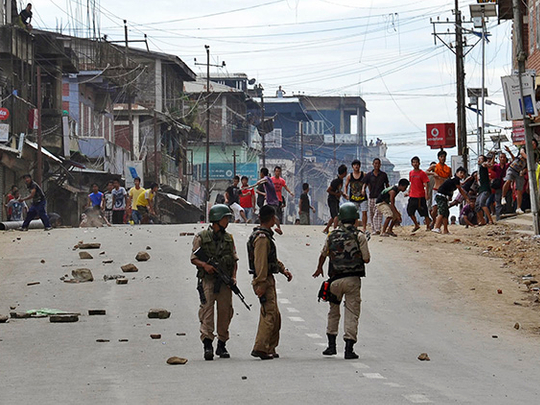
“It’s like Diwali here,” my brother said last night over the phone as gun shots were indiscriminately fired in my hometown of Churachandpur, south of Manipur. The army was trying to control a mob who were in the midst of burning down the homes of the district’s legislators.
But as anyone who knows the troubled state of Manipur and its complicated ethnic mix will tell you, the latest escalation of violence was just waiting to happen.
For many years, there’s been simmering tensions between the state’s predominant Meitei community and its many tribal groups, like the Nagas and the Kukis. The Meiteis are mostly Hindus, they constitute about 50 per cent of the population, and live in the more-developed valley. The rest of the population is made up of tribals, mostly Christians, who live in the hills, administratively referred to as Hill Areas.
Churachandpur, where I am from, is a tribal-dominated district.
While communal riots have flared up between the tribal groups themselves in the past, this time, they are united in their protest against a land bill, which, they say, threatens the very fabric of their existence. The bill gives non-tribals the rights to own land in the Hill Areas, which is currently off-limits to them. The Meiteis are non-tribals.
Because they felt the very people they elected to power had failed to protect them by letting the bill pass without a fight, the anger of tribal protestors took a violent turn on Monday night as they set alight the homes of their local legislators. Eight people have reportedly died from clashes with the army.
Ironically, the bill (one of three bills passed in the Manipur assembly) was described as a means to protect ‘the indigenous people of the state’. It was passed as a result of years of protests in the valleys, mostly by the Meiteis, who demanded the implementation of the Inner Line Permit (ILP).
The ILP is not in force in Manipur, but it is in its neighbouring states of Mizoram, Arunachal Pradesh and Nagaland. Under it, all other Indian citizens from outside the state are required to obtain a special permit before they enter. It’s like a visa, but within one country.
The idea is to regulate travel to certain areas which are near India’s international borders. But Manipur, which shares borders with Myanmar, does not have ILP. This has led to an influx of outsiders who have taken away jobs and property, claim ILP supporters.
Having the ILP rule imposed, say its proponents, would not only protect the state’s indigenous population, but also preserve its culture and identity.
But the tribals don’t agree. They see the ILP as the Meiteis’ attempt to spread their dominance and influence into their areas, which are recognised under the Indian constitution as a special areas.
“We believe that the Manipur government has slyly introduced the Land Reforms Bill under the garb of ILP. We feel that by introducing the land bill, the Manipur government and the Meiteis will try and grab our land. The land in tribal hill areas is governed by customary laws and is held by the chieftain on behalf of the villagers.With this bill the land will fall under the deputy commissioners and the Manipur government, and they will try and take our land from us,” a member of the Kuki Students Organisation was quoted by The Indian Express as saying on Tuesday.
The Meiteis are economically more advanced, while much of the Hill Areas suffer from acute under-development. In Churachandpur, for instance, power supply is limited to only a few hours a day.
The Manipur government cannot implement the ILP on its own. Various bids in the past have been rejected by the central government in New Delhi. And with the latest violent turn, it doesn’t look like it will happen any time soon.
For now, Manipur will exist, as it always has, as a paradox.












